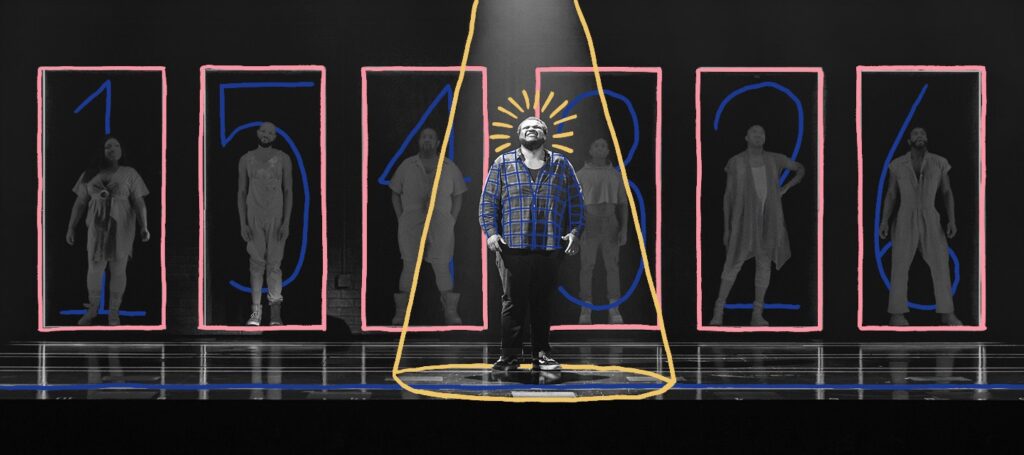


“A Strange Loop” Celebrates the Beauty of Black, Queer Existence
Usher, the protagonist of Michael R. Jackson’s fantastic Pulitzer Prize-winning musical, A Strange Loop, is a Black, gay man writing a musical after his MFA while working as an usher for guests watching Disney’s Broadway hit The Lion King. The meta-musical, directed by Stephen Brackett, follows Usher —played by Jaquel Spivey making his Broadway debut— as he takes center stage surrounded by his thoughts—each personified by actors L. Morgan Lee (Thought 1), James Jackson, Jr. (Thought 2), John-Michael Lyles (Thought 3), John-Andrew Morrison (Thought 4), Jason Veasey (Thought 5), and Antwayn Hopper (Thought 6).
Given Disney heiress Abigail Disney and Katheleen Hughes’ recent documentary The American Dream and Other Fairy Tales, and the labor issues it spotlights, it is crucial and interesting to note Usher’s profession and employer. As the documentary tells us, Disney employees suffer from glaring pay disparities and often find it hard to afford food on their salaries. So, Usher is not just another MFA student trying to write something while working odd jobs but is an entertainment industry worker experiencing gross exploitation and pay inequity. He isn’t just a Black, gay man writing a musical about a Black, gay man but also a Black, gay worker who isn’t being paid his dues. So, when he puts himself in the center of a “Big, Black and Queer-ass American Broadway show,” he is also putting the figure of a worker in a post-capitalist entertainment industry on center stage.
In A Strange Loop, Usher sets out to write a play that speaks to all aspects of his racial, sexual, and physical identities in a way that feels authentic and nuanced—away from the hackneyed depictions of Blackness we’ve seen creators like Tyler Perry capitalize on. What Usher wants to create is somewhat of a magical ephemeral entity, because he has nothing to model it on.
It is a daunting task especially when weighed down by one’s own thoughts, in addition to every system in the society that’s been put in place to deny his dreams and to stop him from pursuing them. It is, in a way, the story of every artist, but Usher (and the musical) work very hard to make it his story. So even when one finds resonances, this is a musical about Usher and Black gay boys like him who either “turned their backs to the Lord” or “chose to go back to the Lord.”
An underlying theme of the musical is the fascination people of color have with white people, the dedication with which we want to be white people in order to delude ourselves into thinking that we’ve somehow climbed rungs and evaded the strain that rests on our bodies for not being white. The musical calls out the massive whitewashing of pop culture when Usher calls out the “‘love is love’ bullshit.” In doing so, he calls for a society where Black men find it liberating just to be with another Black man, instead of giving in to the guiles of a white supremacist culture that is designed to hurt them. “‘Love is love’ will never be true until Black love matters and Black lust matters,” he says. Within a context that is still fighting for Black lives, Usher and Michael R. Jackson are choosing to insert their demands very clearly and demanding that Black men not just live but also thrive, love, and lust—just like white men, just like anyone else who doesn’t need to live their lives jumping hurdles. It’s not a radical demand but given the broken social systems we inhabit and have inherited, A Strange Loop presents itself as a radical play demanding obvious, basic things that should be naturally accessible to everyone, anyway.
The musical’s greatest strength, however, is its inward look. Not once does Usher evade his responsibility as a person whose own insecurities make things worse for him and his creative process. The musical becomes his mouthpiece to speak these insecurities aloud—to make himself vulnerable, present himself as weak and flawed, which (the way society constructs Black masculinity) isn’t something that gets heard, even less so on Broadway.
Complemented by Rona Siddiqui’s music direction, Jackson’s melodies, and Arnulfo Maldonado’s set design (which expands and contracts based on Usher’s emotions), Spivey’s presence (along with his Thoughts) holds space for others to come after him, so that they, too, can have the lights of them as they speak of their unique, haywire lives. I hope that this happens so much and so often that critics no longer feel the need to use the word “radical” when they see the men they take the subway with, the men they see in their delis, and the men they run into in bookstores, also turn up on stage.
Keep Reading

A Glorious “The Skin of Our Teeth” Invites Us to Reflect on How Far We’ve Come
The events that take place in Thornton Wilder’s The Skin of Our Teeth practically cover the entire history of humankind, from the prehistoric ice age to 1950s New Jersey, to the immediate present. Thanks to Lileana Blain-Cruz’s inspired directorial vision and playwright Brandon Jacob Jenkins’ new material, an already prophetic text turns into something that’s […]
Read More
This ‘Funny Girl’ Has Laughs but No Lushness
Before we get to my thoughts on the Beanie Feldstein-led revival of Funny Girl, there are some things I have to confess. I used to love Glee. I loved Lea Michele on Glee. I loved Lea Michele as Rachel Berry as Fanny Brice in a (fictional but prescient) Broadway revival of Funny Girl on Glee. […]
Read More












